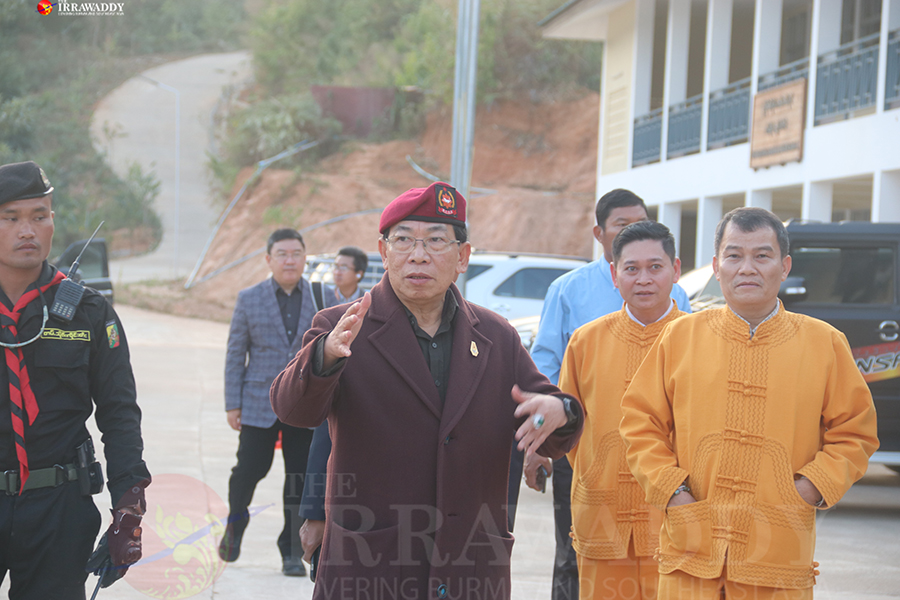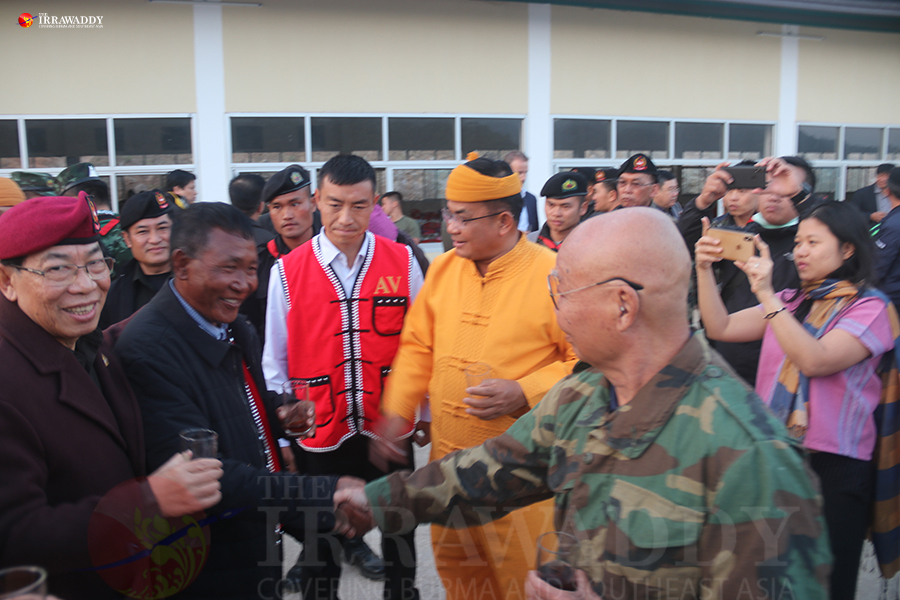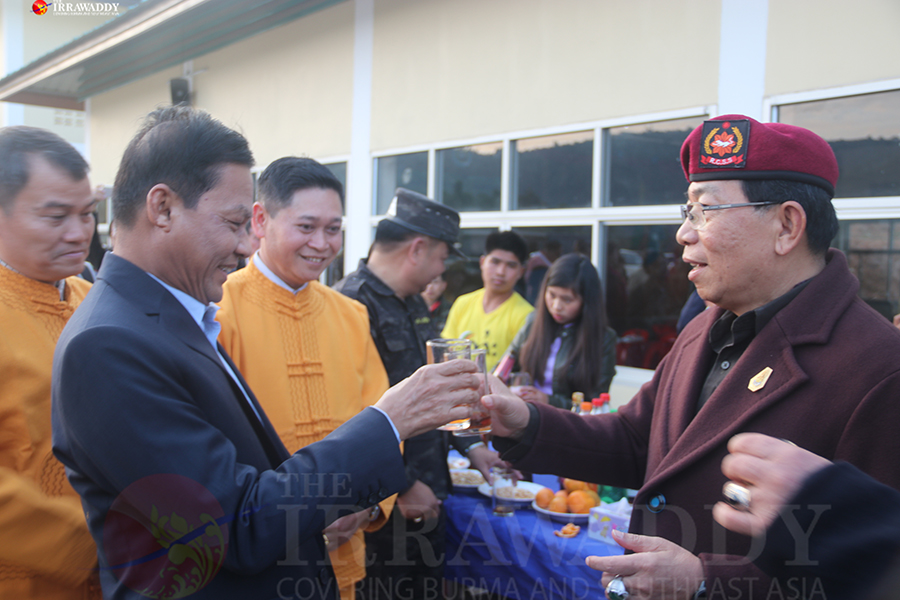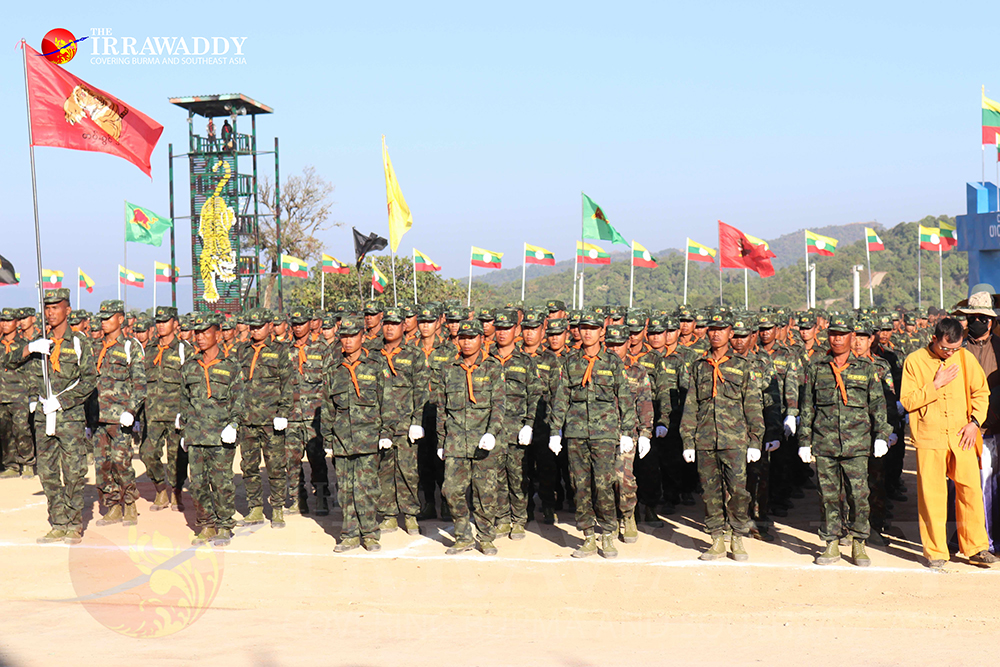LOI TAI LENG, Shan State—A team of editors from The Irrawaddy recently sat down with General Yawd Serk, chairman of the Restoration Council of Shan State/Shan State Army South (RCSS/SSA-S), to talk about the Myanmar peace process, including his efforts to revive the formal peace process as the head of the ethnic armed organizations’ (EAOs) political and peace process negotiation team.
The conversation also focused on his meetings last month with the Myanmar government, led by State Counselor Daw Aung San Suu Kyi and Myanmar military chief Senior General Min Aung Hlaing, and his positions on peacebuilding and Chinese involvement in the process with the Tatamadaw, as the Myanmar military is known.
The Joint-Ceasefire Implementation Coordinating Meeting (JICM) has resumed and the formal peace process has returned to its path. This was partly because of your leadership, as you are now leading the EAOs’ peace process steering team (PPST). What did you do to achieve this?
We tried to overcome nearly two years of deadlock in the peace process and tried to convene the JICM. There are two key issues for the deadlock. One is about [the Tatmadaw’s insistence on] “non-secession” and the Tatmadaw’s six principles. As they have been upholding these principles, negotiations were hard. Therefore, during the JICM, we said that these two issues should not be brought up anymore. As the leaders accepted it, we were able to discuss how to move forward.
Actually, we, the revolutionary armed groups, have never talked about secession. We also discussed it with State Counselor Daw Aung San Suu Kyi. We talked about it.
We have three objectives, as stated in the text of the Nationwide Ceasefire Agreement (NCA). First, our governance system has to be a federal democratic system, so we need to change the governance system. We all know that the military dictatorship is absolutely no good; therefore we all have to work together for the changes.
Second, we have to change the 2008 Constitution. For that, the amendments have to be in accordance with a democratic approach.
Third, we must change the mechanisms around security issues. We have to focus on discussing how the Tatmadaw would change in regards to the security issue, and how to form the state security forces. We need to thoroughly discuss how to make these changes for peace. The security issue is an important issue; we must discuss whether we decide to use police forces for our state security or not, and how to arrange the state security forces and in what forms.
Were these all points discussed in the JICM? And did you also discuss these during your separate meeting with the commander-in-chief of the defense services? What agreements did you reach?
JICM focused on setting the policy and the detailed discussions were to follow at the Union Peace Dialogue Joint Committee [(UPDJC].
When I met with the commander-in-chief [Senior General Min Aung Hlaing], we did not go into details as such. But we discussed how to achieve mutual trust.

We understand that your meeting with the army chief lasted about two-and-a-half hours, and it was an informal talk. Previously, you two had only met for less than five minutes. But this time you met longer and gained some trust and overcame some misunderstandings. Could you elaborate on that? All of us—ethnic Shan, Bamar and the international community—would like to hear more about it, as we have less and less good news these days.
We had not had such a one-on-one meeting with the army chief before. During our talk, we discussed misunderstanding and misinterpretations. Actually, our views on the changes for the betterment of the nation are not so different. The army chief makes changes in his way, and there are only small differences between us because our views and our desires are similar.
Besides this, we also discussed how to halt the renewal of fighting between our ground troops. We discussed how to arrange troop deployments, which can help in building mutual trust between us. In short, the direct conversation with the army chief was good.
What is key is that when the leaders who have the power to make change meet and build mutual understanding, it is for the good. Building peace is a key point for a Union of Myanmar.
We heard the army chief told you three things: that he accepts the need to amend the Constitution, that he accepts a federal Union, and that he needed you to help convince other ethnic armed groups who have not signed the NCA to sign it. When you heard these things, were you surprised? And if so, why?
Yes, I was surprised. We had not had this kind of discussion before. When I heard it, I was quite amazed, because I came to know the army chief’s goals and one of his policies. The army chief speaks in one way [usually harsh] in his usual addresses, but when we had our talk, he spoke in another. So I now have two ways to see things: the way I see his words from our talk and the way [I see] his speeches. We will wait and see [how he will act].
The army chief has been saying that peace must be attained in 2020 and fighting must be ended by including all groups in the peace process. What do you think of this? Does he mean what he says about ending the fighting and is he speaking from the heart or not?
I think the army chief knows very well that the peace process will not be completed in 2020. I also doubt that he wants to just end the peace process in 2020, but I don’t think he means it that way. I believe that we still need to discuss peace negotiations, even for beyond 2020.
When we met him, he said [the Tatmadaw] wants to stop clashes with all groups and offered to broker between the groups to be all-inclusive.

On the 73rd Shan State National Day, celebrated in Loi Tai Leng, your headquarters, high-ranking government officials and military generals attended. This is the first ever such occasion that we know of. How much will this act help the peace process to move forward?
Mainly, we think we have mutual trust around peace building. I would like to highlight a key thing. People generally think that Feb. 7 is just Shan National Day. But actually, Feb. 7 is important not only because the day is significant in Shan history, but also in Myanmar, because without a Feb. 7 agreement, Myanmar would not have its Union Day, which falls on Feb. 12 [when the Panglong agreement was signed]. Therefore, I also discussed with the leaders in Naypyitaw that Naypyitaw should host a big celebration every year from Feb. 7 to Feb. 12, instead of convening only the Union Day. It is because the previous days before Feb. 12 are significant and these days should also be acknowledged.
In Shan politics, you have alliances and armed groups based in northern Shan State. Can you explain your relationship with them?
We have communication with the groups [based in Kachin State and northern Shan State], such as the Kachin Independence Army [KIA], Shan State Progressive Party [SSPP], United Wa State Army [UWSA] and the National Democratic Alliance Army-Eastern Shan State [NDAA]. But we don’t have a direct relationship with the Arakan Army [AA], Ta’ang National Liberation Army [TNLA] and the Kokang Myanmar National Democratic Alliance Army [MNDAA].
The TNLA, AA and MNDAA are still left out of the “all-inclusive” peace process. The government and the army chief requested your help to convince these groups and bring them into the inclusive peace process. What can you do to achieve this?
We raised the issue of an all-inclusive process in the JICM discussions, and that not one group should be left out. We raised the issue with the army chief too, thus he asked us to bring other non-NCA signatories on board.
In Shan State, you have many armed groups including the [Tatmadaw-backed] militias. These different groups were sometimes united but sometimes split. I have known you from your beginning at RCSS as a colonel, a fighting soldier. Now you are the lieutenant general and also leading the political negotiations. How would you unify Shan State and what is your vision for Shan State politics?
As a leader, you cannot hold onto one situation. The situation in the world is also changing fast. So we have to be in constant review. We have over 60 years of civil war [in Shan] because political dialogues were forced to end.
Under [former] president U Thein Sein, ceasefires were offered and peace talks were held. This opened the door to peace and we no longer have to continue the armed fight. We need to focus on mutual discussions and the dialogue is indeed a battle. We will have debates and we must compromise to have a win-win situation. If one side says we won’t continue negotiations if we don’t get what we want, there won’t be dialogue, so win-win dialogue is the key.
Thus, we have to implement peace through negotiations. Only after peace is implemented, then it will help the livelihoods and development of our people and also to change the governance system.

Chinese special envoy for Asian Affairs Sun Guoxiang also asked you to help convince the non-NCA signatories in northern Myanmar as well as the Karenni National Progressive Party during your meeting with him last year. Could you elaborate on your relationship with China?
China was present during the NCA signing [in October 2015] and signed the text as a witness, so they are involved in the NCA implementation process.
In regards to the seven EAOs—the KIA, UWSA, NDAA, SSPP, TNLA, MNDAA and AA–based in northern [and northeast] Myanmar, some say they haven’t signed the NCA because they are backed by China and don’t need to, but we don’t know the details and we cannot confirm this. In our view, China wants Myanmar to reach peace.
Chinese President Xi Jinping visited Myanmar recently [on Jan. 17-18] and signed trade agreements related to its Belt and Road Initiative projects. BRI projects include building roads, bridges and trade routes that will pass through areas in Shan State, where different armed groups are. Some armed groups consent to this, but some don’t and some act neutral. What is the RCSS’s position?
The main thing is to start with discussion, because they cannot talk only to the government and get agreements with them. They need to discuss with local civil society groups. For us, we do not object to road construction but as we have many local groups, consultations with them are needed. For instance, the gas pipelines from Rakhine State pass through Shan State and the Shan State government is supposed to get 5 percent as compensation. But we don’t know anything about it: who accepted the compensation, who signed and how much are local residents compensated?
Our people have lost many things due to the pipelines but they do not have any rights. When we ask [those who build the pipelines] they know nothing.
Our country is no longer under a military government. Therefore mutual discussions are necessary to address the public’s needs. If they want to build roads and bridges, they need to consult with the people. President Xi Jinping also said that his projects are for the people.
The local residents in Shan state object to Chinese-backed projects as they have concerns about damage to the environment. They are worried about the Salween River dam projects, similar to the one in Kachin State, the Myitsone dam project. Have the Chinese come to you as a leader in Shan State to discuss any of this? If so, what is your policy?
We have to listen to the people’s desires. People object because they do not have any rights to compensation. But their objection is not about the project or a rejection of it. They need to know how much they can benefit from these projects. It is not about paying money to each household. How many benefits will we have as a whole state and what percentage will be paid? Everything is related to business, and when it comes to business, the issue of profits follows. If only those leading the projects are profiting and the local residents are not entitled to anything, no one will accept them.

Also, what can you share from your meeting with the State Counselor? Your meetings seem to have all had positive results, from the government, the State Counselor and the army chief.
As I said before, when mutual trust can be built at all levels—at the top, in the middle, with the ground troops and among the public—the path to peace will be smooth. Indeed, our people long for peace. They are concerned and fear when they see the Tatmadaw troops enter into their villages, wondering if the fighting will resume.
Over 60 years of fighting has brought us nothing, no benefits. It is now the time to solve these conflicts through peaceful means and political dialogue. It is not the time to seek a solution through arms. If we continue armed conflicts, our Union will never have peace.
You said the RCSS and TNLA do not have direct communication, but you have been in clashes with the TNLA. Will there be clashes in 2020 between you and the TNLA troops?
The TNLA has its own self-administrated zone in Man Tong and Namhsan, as stated in the [2008] Constitution. Therefore, if they stay in their own territories, there will be less engagement with us. If they try further to control the people outside of their territory, we will not be able to avoid the skirmishes.
Ethnic Shan and Ta’ang people also live together in communities in the RCSS-controlled areas, and we’ve heard they are afraid of the troops from all armed groups, whether it’s the RCSS, TNLA, militia or Tatmadaw. They dare not talk about their experiences of being repressed by ground troops, or even their fear of landmines. If the RCSS ground troops commit acts of repression, what do you do?
We, the SSA troops, uphold our code of conduct. If they commit such acts, we take action against them, according to our laws. The actions taken depend on the severity of the crime, be it stealing, or arbitrary acts, with various terms of imprisonment.
During your address to the PPST meetings, you frequently prioritized the need for unity to achieve peace. Why is that? Why do you need to continue emphasizing unity?
I repeatedly spoke about unity, as we need to be united as one. We have not had such a unified team with different ethnic groups working for peace, throughout our struggle. Thus, I frequently emphasize that we all must work together in solidarity. We have been in an armed revolutionary struggle and are now moving on to political dialogue.
Myanmar is currently facing blame and threatened with sanctions, but on the one hand, there are views that Myanmar must be engaged, and be brought back into the international community. What is your view on that?
As I said earlier, everyone knows that the military government is not totally good but we were under the dictatorship for decades. Therefore, governance must be changed. [The Gambia] sued Myanmar at the ICJ [International Court of Justice] as they have some proof.
In Shan State, because of the military operations in 1996-97, many villages were burnt down and people had to flee [to the Thailand-Myanmar border]. These facts cannot be denied. Our people have to find a way to live in the border areas. Therefore, everyone knows this military governance is not good. [Whether their actions can be changed] entirely depends on those who are in power.

















